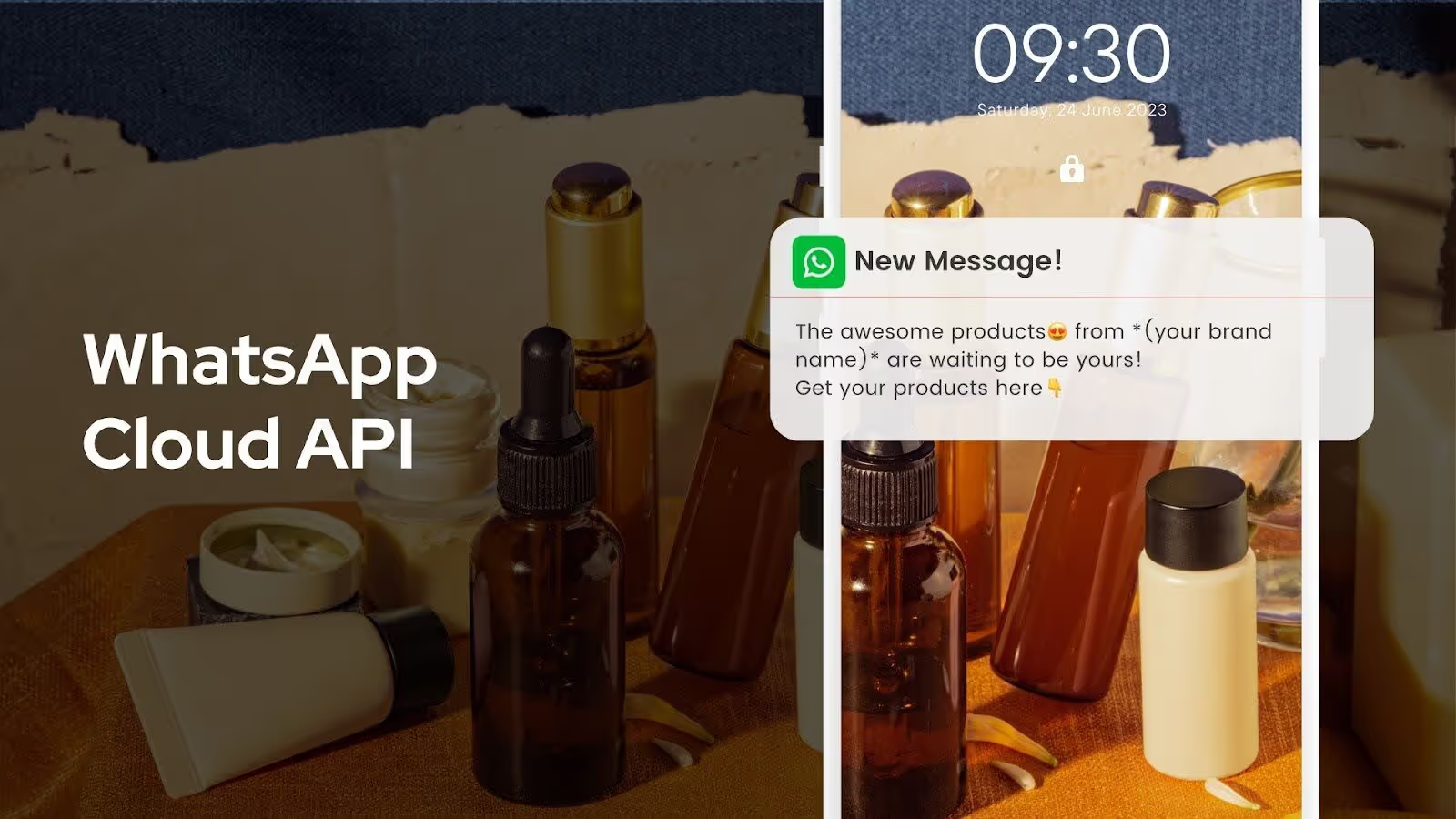Setting Up and Understanding WhatsApp Cloud API: Key Differences and Steps

Peter Drucker once said, “The most important thing in communication is hearing what isn’t said.” In today’s fast-paced digital world, businesses need to stay ahead by responding to customers' words and anticipating their needs. Meta's WhatsApp Cloud API enables businesses to do just that—engage with their customers directly and seamlessly without the hassle of managing servers or complex infrastructure.
With Meta’s managed hosting and automatic updates, businesses no longer need to worry about maintaining servers, performing updates, or handling technical glitches. This enables them to focus entirely on providing timely, personalized communication that enhances customer relationships. Whether it’s answering customer queries, sending real-time updates, or providing ongoing support, the WhatsApp Cloud API helps businesses streamline their communication processes. It’s not just a tool but a vital asset for businesses that aim to deliver efficient and engaging customer experiences in today’s competitive market.
Key Features of WhatsApp Cloud API
The WhatsApp Cloud API provides businesses with a reliable and scalable communication platform to enhance how they engage with their customers. Below are the key features that set it apart:
- Direct Integration:
WhatsApp Cloud API integrates seamlessly with your existing systems, such as customer support tools or CRM platforms. This ensures that all customer conversations are captured in one place, simplifying the workflow and allowing teams to track and manage interactions efficiently. For example, an e-commerce business can connect WhatsApp to its CRM, ensuring that order updates, customer inquiries, and feedback are managed effortlessly in real time.
- Support for Rich Media:
With the ability to send images, videos, documents, and audio files, WhatsApp Cloud API enhances customer interactions by offering more engaging communication options. This feature allows businesses to share product details, service demonstrations, or troubleshooting videos directly with customers, improving customer support and satisfaction. Imagine sending a visual guide or a quick how-to video that helps solve a customer’s issue on the spot.
- Graph API Utilization:
WhatsApp Cloud API is powered by Meta’s Graph API, which ensures better message handling and faster response times. This is especially helpful for businesses managing high message volumes, such as during promotional campaigns or peak sales seasons. The improved performance helps companies to stay responsive, delivering messages efficiently while handling multiple customer queries.
- Automatic Updates:
WhatsApp Cloud API offers the advantage of automatic updates managed by Meta. Businesses benefit from having the latest features and security upgrades without manual intervention. This ensures you can always access new capabilities, such as enhanced encryption, without the hassle of system downtime or complicated updates.
- Scalability and Flexibility:
Whether a small business or a large enterprise, WhatsApp Cloud API grows with your needs. Its flexibility allows firms to handle fluctuating message volumes without interruptions, making it an ideal choice for companies experiencing rapid customer growth or seasonal spikes in activity, like retail stores, during significant sales periods.
- Round-the-clock Availability:
By integrating WhatsApp Cloud API with AI-driven solutions like LimeChat, businesses can provide 24/7 support, ensuring customers always receive timely responses, even outside working hours. This improves customer engagement and retention, as quick and efficient service is always available.
Key Differences Between WhatsApp Cloud API and On-Premise API

Benefits of WhatsApp Cloud API
The WhatsApp Cloud API offers several advantages, making it a top choice for businesses looking to optimize customer communication. From cost-efficiency to flexibility, here are the key benefits:
- No Hosting or Maintenance Costs:
One of the significant benefits of the WhatsApp Cloud API is that it eliminates the need for businesses to invest in servers or rely on external Business Solution Providers (BSPs) for hosting. Meta handles all infrastructure needs, which significantly reduces operational costs. This is particularly helpful for small and medium-sized businesses looking to save on overhead.
- Instant Access to New Features and Security Enhancements:
Since Meta manages the WhatsApp Cloud API, businesses benefit from automatic updates. This means new features, security patches, and performance improvements are rolled out seamlessly without manual intervention. For example, if WhatsApp introduces new messaging capabilities, businesses using the Cloud API will immediately have access to these innovations, ensuring they always stay competitive and secure.
- Scalability for Growing Businesses:
The WhatsApp Cloud API is built to scale effortlessly with your business. As customer demand grows or your messaging needs increase, the API adjusts without requiring significant changes to your infrastructure. This makes it ideal for companies of any size, from startups to large enterprises.
- Seamless Customer Engagement:
With features like rich media support (images, videos, and documents) and direct integration with customer relationship management (CRM) systems, the WhatsApp Cloud API allows businesses to engage with customers more personalized and interactively. This improves customer satisfaction and enhances communication by offering timely responses, multimedia support, and a unified view of customer interactions.
- Cost-Efficiency:
The WhatsApp Cloud API offers a more cost-effective solution for businesses by eliminating the need for third-party BSPs and manual updates. It reduces the complexity and costs associated with managing technical infrastructure, making it a practical option for companies looking to optimize their spending on communication tools.
Setup Process for WhatsApp Cloud API
The WhatsApp Cloud API offers a straightforward setup process designed to be flexible based on the technical capabilities of your business. Whether you’re looking for a quick, no-code solution or prefer a more advanced technical integration, there are two primary ways to set up the API:
- Embedded Signup via Partner Platforms:
For businesses looking for a simple, user-friendly setup, Meta has partnered with several platforms that offer a streamlined signup process. With the embedded signup, you can get started without writing any code or dealing with technical details.
This is perfect for businesses that want to use WhatsApp Cloud API quickly and without complexities. For example, companies can use platforms like LimeChat to set up their WhatsApp Cloud API integration in just a few clicks and start communicating with customers instantly.
- Direct Setup through Meta:
For businesses with more advanced technical resources, the direct setup through Meta provides greater control and customization. This method requires developers to work with Meta’s developer tools and APIs, allowing for deeper integration with your existing systems.
While this setup requires more coding knowledge, it provides flexibility for businesses that want to create highly customized workflows. Meta offers comprehensive documentation to guide developers through the process, ensuring smooth integration with existing platforms like CRMs or marketing automation tools.
Both methods ensure that once set up, businesses can start using WhatsApp’s messaging capabilities immediately, with the added benefit of Meta’s automatic updates and infrastructure management.
Pros and Cons of WhatsApp Cloud API
Like any technology, the WhatsApp Cloud API has advantages and limitations. Here’s a balanced look at the pros and cons:
Pros:
- Cost-Efficiency:
With Meta managing the hosting, updates, and security, businesses save significantly on infrastructure and maintenance costs. There’s no need to invest in servers or pay third-party providers, making it a budget-friendly option for companies of all sizes.
- Ease of Setup and Use:
Whether using a no-code platform for a quick integration or opting for a custom setup through Meta’s developer tools, the WhatsApp Cloud API offers flexibility in setup options. This ensures that businesses can start using the API efficiently regardless of their technical expertise.
- Automatic Updates and Security:
Meta automatically updates the WhatsApp Cloud API, which means businesses always have the latest features and security patches without the need for manual intervention. This not only saves time but also ensures that businesses are protected from potential security vulnerabilities.
- Scalability:
The Cloud API grows with your business, allowing you to handle increasing message volumes without worrying about server capacity. This makes it ideal for companies that experience seasonal spikes or rapid growth.
- Direct Support from Meta:
By using WhatsApp Cloud API, businesses benefit from Meta’s direct support, which ensures faster troubleshooting and more reliable performance than relying on third-party providers.
Cons:
- Data Hosting Concerns:
Since Meta hosts the WhatsApp Cloud API, some businesses—especially those dealing with sensitive customer data—may have concerns about data privacy and hosting. This could be a drawback for industries with strict compliance requirements.
- Limited Customization:
While the WhatsApp Cloud API provides many features, some businesses might find the customization options less flexible than those of the On-Premise API. The Cloud API is streamlined for efficiency but may need more advanced customizations that larger enterprises or highly technical businesses might need.
- Potential Latency:
As with any cloud-based service, there may be occasional latency issues, especially when dealing with high message volumes or peak usage times. Businesses should assess their needs to determine if this would impact their communication strategy.
Pricing Structure and Conversation Charges
The WhatsApp Cloud API operates on a conversation-based pricing model, where businesses are charged based on the number of conversations they initiate or receive. This model helps companies to maintain cost transparency and control, as they only pay for the interactions they have with customers. Here’s how the pricing works:
Conversation-Based Pricing:
- User-Initiated Conversations:
When a customer sends a message to your business, it starts a 24-hour session during which you can reply and engage with the customer without additional charges. If the customer re-engages, the session resets after 24 hours, starting a new conversation cycle.
- Business-Initiated Conversations:
If your business sends the first message to a customer (such as a promotional message, alert, or reminder), it also initiates a 24-hour conversation window. Each new business-initiated message outside this window is charged as a separate conversation. This can include automated messages like order updates, appointment reminders, or promotional offers.
- No Setup or Hosting Costs:
One key advantage of WhatsApp Cloud API is that there are no upfront setup costs or hosting fees. Since Meta handles the infrastructure and updates, businesses avoid the additional costs of managing their servers or paying for external hosting.
Examples of Pricing:
- Pricing varies depending on the region and volume of messages sent, but typically, businesses are charged a fixed rate per conversation.
- For instance, in some regions, user-initiated conversations may be priced lower than business-initiated ones due to the nature of engagement. This encourages businesses to prioritize customer engagement and reduce unnecessary outbound messaging.
Control Over Costs:
The conversation-based pricing model ensures that businesses pay only for what they use. By tracking message volumes and strategically managing customer interactions, businesses can maintain control over their spending and ensure cost efficiency.
Impact and Scenarios for Businesses
The WhatsApp Cloud API provides many benefits for businesses across various industries. Its scalability, flexibility, and ease of use suit companies at different stages, from small startups to large enterprises. Here are a few scenarios where the WhatsApp Cloud API can have a significant impact:
1. Seamless Transition for Existing WhatsApp Business API Users:
Businesses already using the WhatsApp Business API can switch to the WhatsApp Cloud API without significant disruptions. The Cloud API offers the same messaging capabilities with the added benefits of Meta-managed hosting and automatic updates, making it a seamless upgrade for businesses looking to reduce infrastructure costs and maintenance headaches.
2. Simplified Setup for New Users:
For businesses new to WhatsApp’s messaging solutions, the Cloud API offers an accessible entry point. The embedded signup process allows companies to get started quickly without needing technical expertise or third-party providers. Whether it’s a small ecommerce brand looking to offer real-time customer support or a service-based company sending appointment reminders, the Cloud API streamlines the process.
3. High-volume messaging for Growing Businesses:
Maintaining timely communication becomes a challenge as businesses grow and their customer bases expand. The WhatsApp Cloud API is designed to handle high volumes of messages, making it ideal for businesses experiencing rapid growth. For example, ecommerce companies during peak shopping seasons, like Black Friday or holiday sales, can rely on the Cloud API to manage customer queries, order confirmations, and shipping updates without disruptions.
4. Improved Customer Support for Service-Based Businesses:
Service-based businesses, such as healthcare providers or travel agencies, can use WhatsApp Cloud API to offer faster, more personalized communication. Whether answering customer queries or sending out automated appointment reminders, the Cloud API ensures businesses can manage these interactions efficiently, improving customer satisfaction.
5. Cost-Effective Communication for Small and Medium Enterprises (SMEs):
Small and medium-sized businesses often face budget constraints, making cost-effective communication solutions essential. The conversation-based pricing model and the absence of infrastructure or maintenance costs make the WhatsApp Cloud API a budget-friendly way for SMEs to maintain customer engagement. SMEs can scale their communication efforts based on demand, ensuring they only pay for the messages they send and receive.
Conclusion
The WhatsApp Cloud API is a powerful tool for businesses to streamline communication, improve customer engagement, and scale their messaging capabilities without the burden of managing complex infrastructure. By leveraging Meta’s managed hosting and automatic updates, businesses of all sizes can focus on what truly matters—building meaningful relationships with their customers.
Whether you’re a startup looking for a quick setup or an enterprise aiming to reduce costs, the WhatsApp Cloud API offers the flexibility, scalability, and efficiency needed to support your communication strategies. With features like rich media support, seamless integration, and conversation-based pricing, it’s clear that the Cloud API is a valuable asset for businesses looking to thrive in today’s competitive landscape.
LimeChat can further enhance the value of WhatsApp Cloud API by providing AI-powered automation, helping businesses manage customer conversations effortlessly. LimeChat integrates smoothly with the Cloud API, enabling features like personalized messaging, instant replies, and 24/7 support without manual intervention. When combined with WhatsApp Cloud API, LimeChat offers a comprehensive solution for efficient and engaging communication for businesses looking to elevate their customer support and sales efforts.
As businesses prioritize customer engagement, adopting a solution like WhatsApp Cloud API can make all the difference in staying connected, efficient, and responsive to customer needs. The question isn’t whether you should implement the Cloud API but how soon can you get started.
Ready to improve your business communication? Start integrating WhatsApp Cloud API with LimeChat today to deliver seamless customer interactions and stay ahead of the competition.
Transform your marketing and support today








.avif)